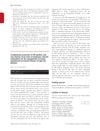 4 citations,
December 2009 in “Current Medical Research and Opinion”
4 citations,
December 2009 in “Current Medical Research and Opinion” Dermatologists are more comfortable and proactive in treating male pattern hair loss than primary care physicians.
 3 citations,
September 2022 in “Frontiers in psychiatry”
3 citations,
September 2022 in “Frontiers in psychiatry” University students in Egypt experienced high stress during COVID-19's third wave, with negative coping mechanisms being more common.
 3 citations,
May 2018 in “Experimental Dermatology”
3 citations,
May 2018 in “Experimental Dermatology” Young HS patients often have other physical and mental health issues, and research on HS covers a wide range of topics including genetics, triggers, treatments, and the need for more data.
 3 citations,
January 2015 in “Case reports in psychiatry”
3 citations,
January 2015 in “Case reports in psychiatry” Sertraline can cause hair loss, which stops after stopping the drug.
 3 citations,
January 2006 in “Dermatologic Surgery”
3 citations,
January 2006 in “Dermatologic Surgery” The International Society of Hair Restoration Surgery established a curriculum in 2005 to standardize knowledge and skills for treating hair loss, emphasizing it as a multidimensional specialty.
 3 citations,
September 2016 in “British Journal of Dermatology”
3 citations,
September 2016 in “British Journal of Dermatology” Warts in HIV-positive men can have serious abnormal cell growth, needing careful analysis and treatment to prevent cancer.
 2 citations,
October 2023 in “Dermatology and therapy”
2 citations,
October 2023 in “Dermatology and therapy” Alopecia areata severely impacts quality of life, causing anxiety, depression, and work impairment.
 2 citations,
September 2023 in “JMIR. Journal of medical internet research/Journal of medical internet research”
2 citations,
September 2023 in “JMIR. Journal of medical internet research/Journal of medical internet research” Machine learning can predict symptoms and quality of life in chronic skin disease patients using smartphone app data, and shows that app use varies with patient characteristics.
 2 citations,
June 2000 in “Journal of Oral and Maxillofacial Surgery”
2 citations,
June 2000 in “Journal of Oral and Maxillofacial Surgery” Hair transplantation techniques have improved over time, leading to natural-looking results and high graft survival rates, making it a popular treatment for hair loss.
 2 citations,
October 1997 in “Dermatologic Clinics”
2 citations,
October 1997 in “Dermatologic Clinics” The document concludes that advancements in hair restoration surgery have led to more natural results and patient satisfaction, with hope for future improvements in treatment.
 1 citations,
May 2021 in “Journal of Cosmetic Dermatology”
1 citations,
May 2021 in “Journal of Cosmetic Dermatology” Cosmetic foam product reduces hair loss and increases hair density in men.
 1 citations,
September 2020 in “Cochrane library (CD-ROM)”
1 citations,
September 2020 in “Cochrane library (CD-ROM)” The analysis aims to identify the most effective and safest treatments for alopecia areata.
 1 citations,
January 2020 in “Revista Brasileira de Ciência Veterinária”
1 citations,
January 2020 in “Revista Brasileira de Ciência Veterinária” A cat in Brazil had severe skin issues worsened by improper treatment.
 1 citations,
March 2019 in “Actas Dermo-Sifiliográficas”
1 citations,
March 2019 in “Actas Dermo-Sifiliográficas” New cancer treatments are less harmful to hair but can still cause hair loss, color, shape, and growth changes.
 1 citations,
January 2019 in “Springer eBooks”
1 citations,
January 2019 in “Springer eBooks” Hidradenitis Suppurativa is a chronic skin condition best treated early with surgery for better outcomes and less recurrence.
 1 citations,
December 2018 in “IntechOpen eBooks”
1 citations,
December 2018 in “IntechOpen eBooks” Human hair shows promise for non-invasive medical testing, but more research is needed to standardize its use.
 1 citations,
January 2017 in “Elsevier eBooks”
1 citations,
January 2017 in “Elsevier eBooks” The document concludes that new treatments for hair loss may involve a combination of cosmetics, clinical methods, and genetic approaches.
 1 citations,
January 2015 in “Springer eBooks”
1 citations,
January 2015 in “Springer eBooks” Chemotherapy can cause skin side effects that affect patients' lives, but they can be managed to avoid interrupting cancer treatment.
 1 citations,
January 2010 in “Elsevier eBooks”
1 citations,
January 2010 in “Elsevier eBooks” Any drug can cause skin reactions, but antibiotics, NSAIDs, and psychotropic drugs are more common, with some reactions being life-threatening.
 1 citations,
January 2001 in “Dermatologic Surgery”
1 citations,
January 2001 in “Dermatologic Surgery” Pulsed dye laser and hydrogel dressings effectively treat hypertrophic scars.
 1 citations,
September 2022 in “JMIR dermatology”
1 citations,
September 2022 in “JMIR dermatology” Alopecia Areata greatly affects the quality of life and mental health of Canadian patients and their caregivers.
 1 citations,
October 2018 in “InTech eBooks”
1 citations,
October 2018 in “InTech eBooks” The document concludes that treatments for cicatricial alopecia are not well-supported by evidence, but hair transplantation shows more predictable and satisfactory results.
 June 2024 in “Nature Cell and Science”
June 2024 in “Nature Cell and Science” The Scalp Coverage Scoring method reliably measures hair density from images.
 April 2024 in “Cognizance journal”
April 2024 in “Cognizance journal” The alexandrite laser effectively reduces unwanted hair by about 75%.
 March 2024 in “Tropical Journal of Natural Product Research”
March 2024 in “Tropical Journal of Natural Product Research” Many people in Fez-Meknes use potentially toxic plants for various health and cosmetic purposes, but more research is needed to ensure their safety.
 March 2024 in “Clinical, cosmetic and investigational dermatology”
March 2024 in “Clinical, cosmetic and investigational dermatology” Severe alopecia areata greatly impacts quality of life, mental health, and daily activities.
 January 2024 in “Arquivo Brasileiro de Medicina Veterinária e Zootecnia/Arquivo brasileiro de medicina veterinária e zootecnia”
January 2024 in “Arquivo Brasileiro de Medicina Veterinária e Zootecnia/Arquivo brasileiro de medicina veterinária e zootecnia” A cat with ear infection and skin issues was successfully treated for Demodex mites using imidacloprid and moxidectin.
 December 2023 in “Dermatology and therapy”
December 2023 in “Dermatology and therapy” Japanese patients and physicians often disagree on the severity of Alopecia Areata and treatment satisfaction, needing better communication and treatments.
 November 2023 in “Scholars journal of applied medical sciences”
November 2023 in “Scholars journal of applied medical sciences” Twelve plants, especially castor oil and coconut, are beneficial for managing afro-textured hair.
 November 2023 in “Scholars academic journal of biosciences”
November 2023 in “Scholars academic journal of biosciences” Trichotillomania can cause severe complications like hairballs in the stomach, needing surgery and psychiatric care.





























